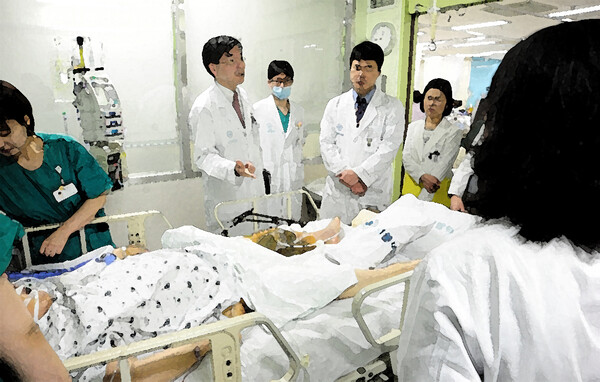
Quite a few people believe Korean doctors make more money than their colleagues in the Organization for Economic Cooperation and Development (OECD) countries.
However, a doctors' group said that the belief, based on the OECD Health Statistics, is misguided, resulting from the distorted data analysis.
Many of the 38 OECD countries with higher per capita GDP than Korea did not submit data on physician income, and the rankings vary depending on the criteria used. The OECD announces doctors’ income in its member countries after dividing their revenue by the U.S.$ PPP, which reflects their currency’s exchange rate against the U.S. dollar and purchasing power parity (PPP) index.
According to the OECD Health Statistics 2023, salaried Korean physicians earned an average annual income of $192,749 (about 255 million won) based on the PPP exchange rate in 2020, the highest among 28 countries that submitted related data. Those who opened their clinics earned an average of $298,800, second only to Belgium ($337,931).
However, the Research Institute for Healthcare Policy (RIHP), a research arm under the Korean Medical Association, pointed out that the ranking of doctors' income by country varies depending on where they set the criteria. The institute added that many countries with higher per capita GDP than Korea did not submit physician income data to the OECD, skewing the comparison.
Of the 38 OECD countries, 17 have higher per capita GDP than Korea. Switzerland, the U.S., Austria, Australia, and Canada did not submit physician income data to the OECD. Japan, which is said to earn more than Korean doctors, did not submit data. Luxembourg has the highest per capita GDP and has not submitted data on physician income since 2015.
The types of data submitted by member countries also vary.
Nineteen countries, including Australia, Austria, and Canada, only submit data on the income of clinic operators (specialists + general practitioners), while seven countries, including the Czech Republic and Greece, only submit data on salaried physicians in hospitals. Belgium, Estonia, France, Germany, and the U.K. submit data on clinic operators and salaried physicians in the case of specialists while submitting only clinic operators’ data for general practitioners. Only three countries -- Korea, Israel, and the Netherlands -- submit all four data types.
Using the ordinary exchange rate instead of the PPP exchange rate, Korean specialists’ income ranks seventh in 30 OECD countries in the case of salaried physicians and fifth of 10 in the case of owner-operators (excluding Luxembourg, which stopped submitting data in 2015), the institute noted.
Adjusted for exchange rates, it noted that Korean general practitioners’ income ranks eighth out of 18 countries for salaried physicians and 13th out of 14 countries for clinic operators, belonging to mid- to low-level in the OECD.
"Countries with higher rankings in the PPP exchange rate compared to the exchange rate, such as Korea's salaried specialists, are mainly because they live in countries highly influenced by exchange rates and prices, including energy, fertilizer, and agricultural products," the institute explained. "In contrast, lower-ranked countries in the PPP exchange rate compared to the exchange rate are in countries less dependent on imports or less affected by exchange rates."
In Korea, the exchange rate was 1180.27 won against the dollar in 2020, but it explained that the PPP rate was 982.10 won. Comparing the income by applying the exchange rate and the PPP rate, Korean doctors’ income appears to be 20 percent higher in the latter case, it added.
"During the recent debate on medical school enrollment, some national research institutes published distorted OECD physician income data, and the media quoted them, claiming that Korean physician income is at the top of the OECD," RIHP Director Woo Bong-shik said. "Nevertheless, they morally condemn doctors as if they avoided essential medical care or community service, and use the distorted income rankings to manipulate the public option toward increasing medical school enrollment."
Medical school enrollment should be discussed and decided transparently and rationally at a “physician workforce adjustment body” composed of experts, as are the cases with the U.S., Japan, and the Netherlands, to minimize social conflicts and adverse effects, Woo added.

